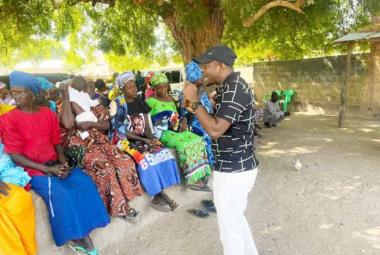By Mariatou Ngum
The Ministry of Trade, Industry, Regional Integration and Employment (MoTIE) last week held a two-day workshop to validate the National Country Strategy for the Development of two groups of Green Value Chains (“Vegetable and Oils, Fats” and “Fruits) and Processed Fruit Products”) resilient to climate change in the context of the African Continental Free Trade Area (AfCFTA).
In his opening statement at the event, held at the Senegambia Beach Hotel, Mr Ismaila Danso, the Deputy Permanent Secretary, deputising for the Permanent Secretary of MoTIE thanked the participants for attending the event while expressing sincere appreciation to UNCTAD for selecting The Gambia to be among this regional Value Chain Strategy that is embedded within the AfCFTA.
He said the first Green Value Chains have to do with mango, sesame cashew and palm oil. The occasion, he said, signifies a crucial step towards achieving inclusive economic growth, socio-economic empowerment, and sustainable development in The Gambia.
Mr Danso noted that the National Strategy was developed collaboratively, following a nationwide regional tripartite stakeholder consultation from the policy space, regulators and actors. By adopting this bottom-up approach, he mentioned that MoTIE demonstrates its dedication to recognising and valuing inputs from various stakeholders. This, he added, will go a long way towards addressing critical challenges that nations are faced with; especially those that relate to informality in the economy.
Before the development of this strategy, he disclosed that there was a study, which diagnostic analysis involved assessing and analysing various aspects of the production, processing, marketing, and distribution of the four value chains within the country.
Malick Khan, Trade Expert at UNCTAD stated that they have a long standing partnership with the Gambian authorities while expressing delight to be part of the validation workshop. On behalf of UNCTAD, he thanked the respective institutions for their contributions during the consultations leading up to the workshop.
The entry into force on 1st January 2021 of the African Continental Free Trade Area agreement is a major opportunity for the promotion of sustainable inclusive economic development across the continent. Achieving such an objective requires both increased cooperation between State Parties and the implementation of a strategic planning process at the level of each of them, as evidenced by the adoption of National Strategies for the Implementation of the AfCFTA.
In view of the growing climate emergency, the achievement of this sustainable development goal also requires greater consideration of the impact of climate change on production systems and intra-African trade. In this context, ECA and UNCTAD are jointly coordinating a technical assistance project to support the inclusion of green initiatives in national AfCFTA implementation strategies in 20 countries across the continent.
In The Gambia, the project is being implemented as part of collaboration between the Ministry of Trade, Industry, Regional Integration and Employment (MOTIE) and UNCTAD. The Project for the Inclusion of Green Initiatives in National AfCFTA Implementation Strategies aims at the formulation and adoption of green value chain strategies focused on the sub-regional market and the African continental market. Following a process of consultation and analysis of trade and climate data in The Gambia, the vegetable oils and fats and fruits and processed fruit products value chains were selected as priority green value chains for The Gambia.







